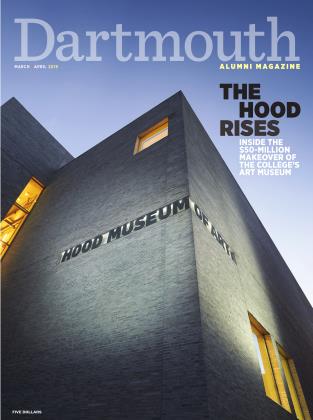EUREKA!
notebook
CAMPUS
[NEW FINDINGS AND RESEARCH]
Confirmed Women were supremely polarized.
“Brett Kavanaugh’s confirmation reminded us of how sharply women disagree about how allegations of sexual misconduct should be handled and even about what it means to identify as a woman in U.S. politics today,” says Jim Woo Kim, a postdoctoral fellow in the quantitative social science program. The confirmation of Judge Kavanaugh polarized public trust in the U.S. Supreme Court and motivated women to vote, according to Kim’s analysis. Kim surveyed 4,000 U.S. voters before and after the U.S. Senate floor vote to measure the influence of the confirmation proceedings. He found that Republican-leaning women were more likely to vote for the Republican Party and they viewed the Supreme Court more favorably after the confirmation. Independent women were motivated to vote for Democrats, and Democratic-leaning women increasingly mistrusted the Supreme Court.
Bible Code
Research unlocks “divine dataset.”
»> A team of computer scientists turned to the Bible to develop algorithms that can convert English texts into different styles for different audiences. The researchers used 34 stylistically distinct English-language versions—from the King James Bible to the Bible in Basic English—to produce 1.5 million translation pairings of 31,000 sacred verses. This data enabled algorithms to learn how the same source material can be translated into different styles within the same language. “The Bible is a divine dataset to work with,” says professor Dan Rockmore, contributing author on the study, published in Royal Society Open Science. “Humans have organized Bible texts for centuries, so we didn’t have to put our faith in less reliable alignment algorithms.” In the future, Bible-generated algorithms could help translate complex works of literature into simplified versions for young readers or nonnative English speakers.
 View Full Issue
View Full Issue
More From This Issue
-
 COVER STORY
COVER STORYThe Art of Curation
MARCH-APRIL 2019 By LEAH FLICKINGER -
 FEATURE
FEATUREPay It Forward
MARCH-APRIL 2019 By ABIGAIL DRACHMAN-JONES '03 -
 Books
BooksPop Fiction
MARCH-APRIL 2019 By JULIA M. KLEIN -
 readers react
readers reactYOUR TURN
MARCH-APRIL 2019 -
 CLASS NOTES
CLASS NOTESClubs & Groups
MARCH-APRIL 2019 -
 notebook
notebookLost in Paradise
MARCH-APRIL 2019 By JOE GLEASON ’77
Notebook
-
 notebook
notebookNEWS AND NOTES
JULY | AUGUST 2016 -
 notebook
notebookHat Tricks
JANUARY | FEBRUARY 2017 -
 Notebook
NotebookUPFRONT “Humane Thinker”
JULY | AUGUST 2025 -
 notebook
notebookSmoke Out
MARCH | APRIL 2021 By Madison Wilson ’21 -
 notebook
notebookOpen To Debate
MAY | JUNE 2024 By NANCY SCHOEFFLER -
 notebook
notebookTake a Hike!
JULY | AUGUST 2023 By Svati Kirsten Narula ’13

